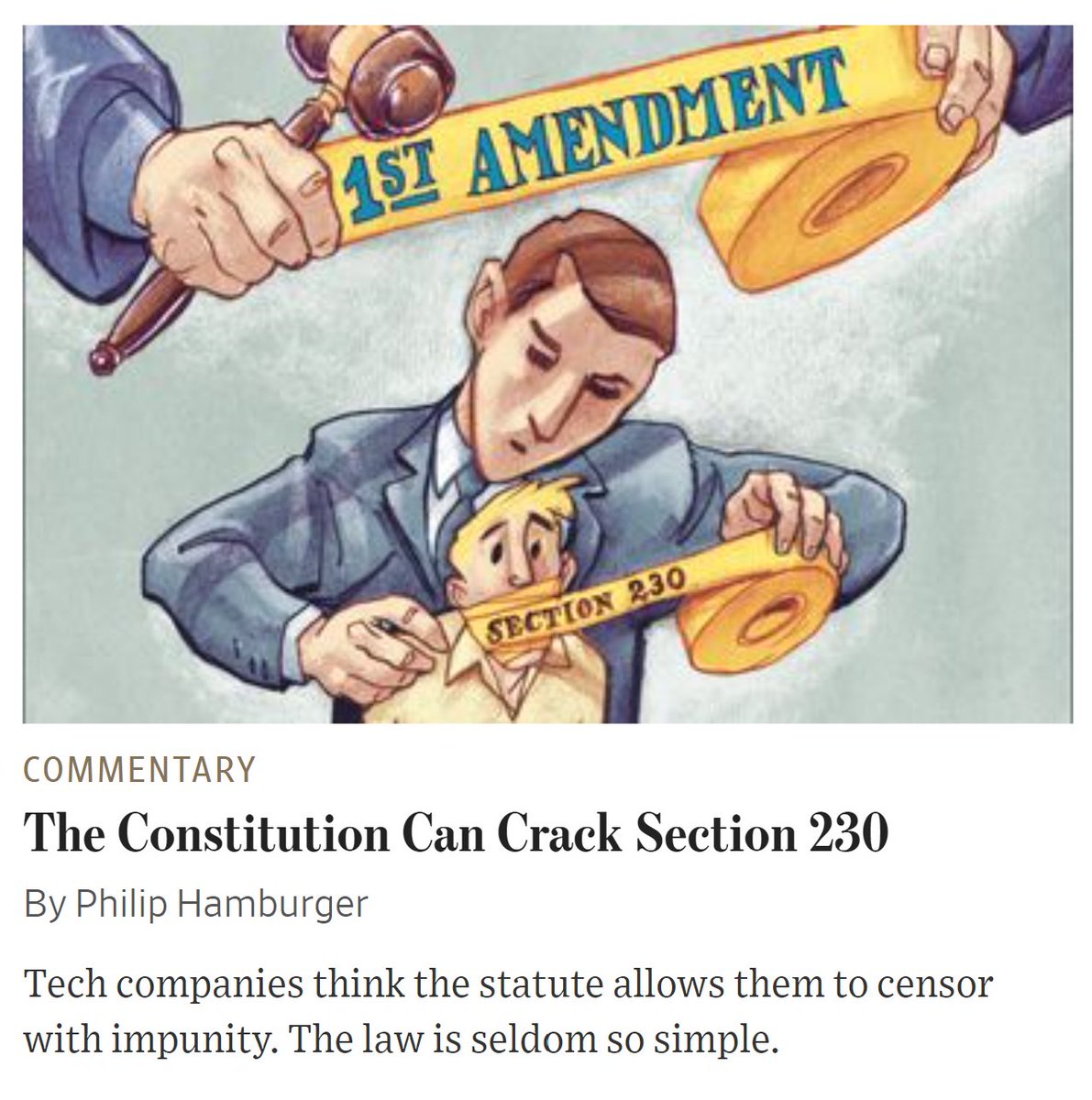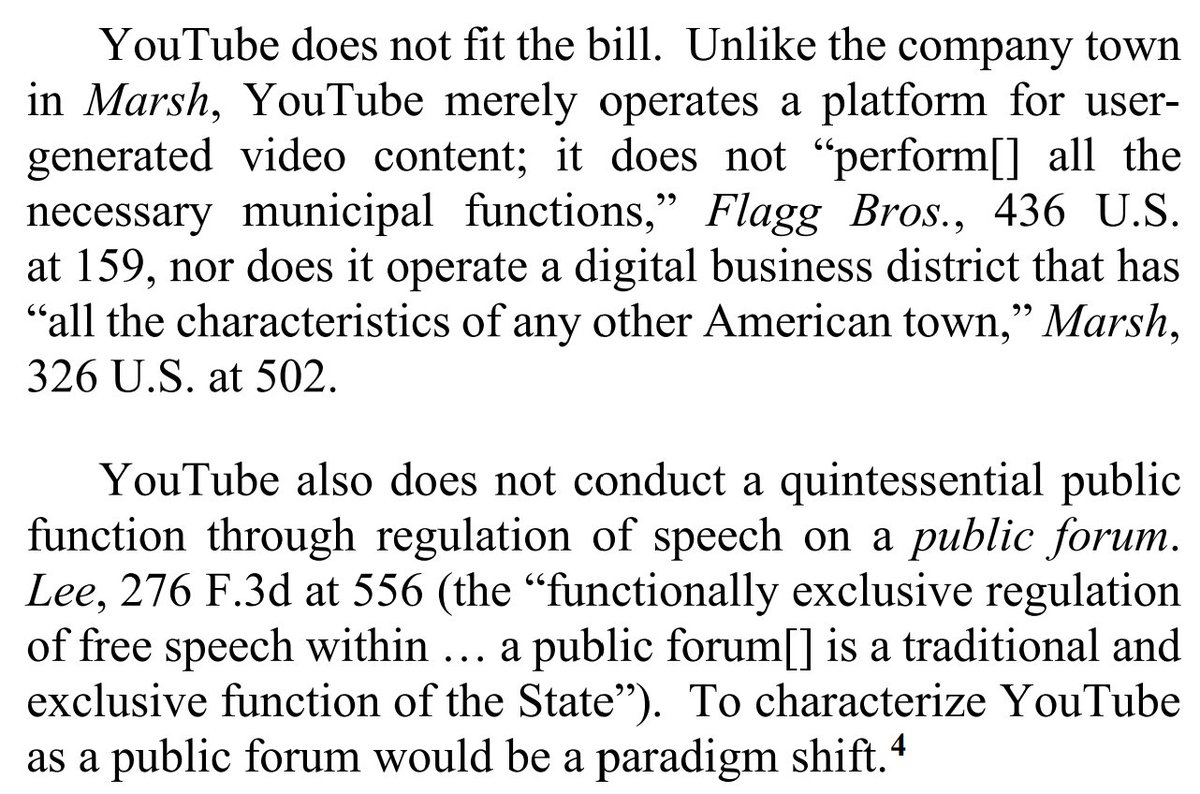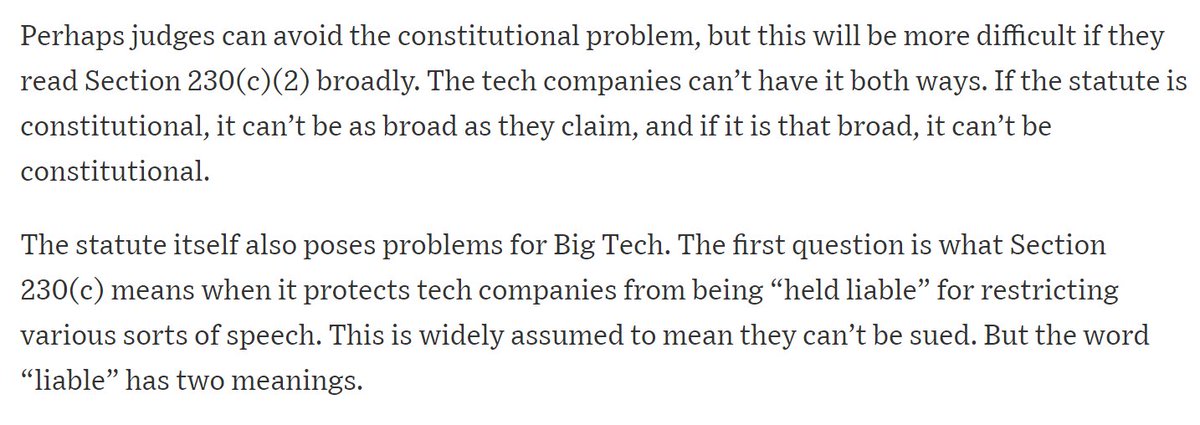Can we talk for a moment about this @WSJopinion piece by Philip Hamburger?
The prof has name recognition, so they let him put his musings about Section 230 in their op ed page.
Whether he grasped the subject matter was apparently irrelevant.
Thread.
The prof has name recognition, so they let him put his musings about Section 230 in their op ed page.
Whether he grasped the subject matter was apparently irrelevant.
Thread.
2/ Prof H takes for granted that the "great deplatforming" is bad.
Are the people being banned QAnoners, "Stop the Steal" conspiracists, racists, insurrectionists? Prof H doesn't seem curious to find out.
Are the people being banned QAnoners, "Stop the Steal" conspiracists, racists, insurrectionists? Prof H doesn't seem curious to find out.
3/ Prof H says that Sec 230(c)(2) contains the law's "key language."
No, it doesn't. Most Sec 230 cases are resolved under (c)(1), which protects a platform when it acts as the publisher of another's content.
Assuming he studied Sec 230 cases, Prof H should know this . . .
No, it doesn't. Most Sec 230 cases are resolved under (c)(1), which protects a platform when it acts as the publisher of another's content.
Assuming he studied Sec 230 cases, Prof H should know this . . .
4/ . . . but has he? Granted, he's carefully gerrymandered his definition to miss a lot of it.
Still, Prof H's assertion that there's "little if any" pertinent case law is a head-scratcher. The good professor clearly does not follow @ericgoldman's blog.
Still, Prof H's assertion that there's "little if any" pertinent case law is a head-scratcher. The good professor clearly does not follow @ericgoldman's blog.
5/ Some of Prof H's points are well-covered territory.
Prof H is not the first, for instance, to suggest that a platform is akin to a public forum or company town.
Frankly, this is @BadSec230Takes stuff -- in the pages of one of the nation's most prominent papers.
Prof H is not the first, for instance, to suggest that a platform is akin to a public forum or company town.
Frankly, this is @BadSec230Takes stuff -- in the pages of one of the nation's most prominent papers.
6/ PragerU raised the public-forum argument in its lawsuit against YouTube. The Ninth Circuit rejected it (in one of those decisions Prof H says don't exist).
7/ But really, says Prof H, the platforms are like state actors, bc they're "massive companies."
He doesn't do the hard work of establishing that, say, Twitter is a monopoly.
No, he just asserts that once you're big, you somehow lose your 1st A right of free association.
He doesn't do the hard work of establishing that, say, Twitter is a monopoly.
No, he just asserts that once you're big, you somehow lose your 1st A right of free association.
8/ That's not how the 1st A works.
And even if the companies were smaller, they'd still be banning insurrectionists, QAnon, etc.
There are many cloud providers. None wants to work w/ Parler.
The people Prof H wants new "civil-rights statutes" for are by and large extremists.
And even if the companies were smaller, they'd still be banning insurrectionists, QAnon, etc.
There are many cloud providers. None wants to work w/ Parler.
The people Prof H wants new "civil-rights statutes" for are by and large extremists.
9/ The piece goes on and on about (c)(2): its list of distinct forms of content; its reference to "any action" by a platform; its language about what platforms cannot be "held liable" for.
Again, most cases ARE NOT DECIDED UNDER (c)(2).
Again, most cases ARE NOT DECIDED UNDER (c)(2).
10/ Under (c)(1), a platform shall not "be treated as the publisher or speaker" of others' content.
This protection extends to all the functions of a publisher, including withdrawing or barring content.
In obsessing over (c)(2), Prof H is tilting at windmills.
This protection extends to all the functions of a publisher, including withdrawing or barring content.
In obsessing over (c)(2), Prof H is tilting at windmills.
11/ "As litigation comes before the courts," Prof H says, as though he were the first to scrutinize Sec 230, and as though there weren't tons of precedent on this law already.
And no, companies refusing to host cranks is not "privatized censorship." It's freedom of association.
And no, companies refusing to host cranks is not "privatized censorship." It's freedom of association.

 Read on Twitter
Read on Twitter











